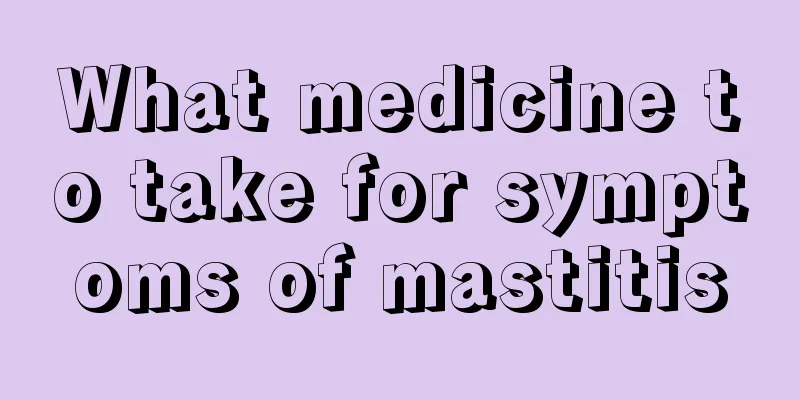What medicine to take for symptoms of mastitis

|
From the perspective of clinical research, milk congestion and bacterial invasion are common causes of mastitis. Patients will show symptoms such as breast pain, lumps, and pus discharge. In this case, antibiotics are the first choice for treatment. In addition, sealing, paying attention to cleaning, using milk-reducing drugs, draining pus, hot compresses, etc. also have certain effects. If the recovery effect is not very good, the patient must go to the hospital for professional treatment in time. 1. What are the causes of mastitis? 1. Milk stasis: Milk stasis is conducive to the growth and reproduction of invading bacteria. The reasons are: ① The nipples are too small or inverted, which hinders breastfeeding. The pregnant woman fails to correct the inverted nipples in time before delivery, making it difficult for the baby to suck milk; ② There is too much milk and it is not completely emptied. The mother fails to empty the excess milk in the breast in time. ③ Milk duct obstruction, milk duct inflammation, tumors and external pressure, and fibers shed from bras can also block the milk ducts. 2. Bacterial invasion: When the nipple is inverted, it is difficult for the baby to suck milk, which can easily cause damage around the nipple, and is the main way for bacteria to invade along the lymphatic vessels and cause infection. In addition, if babies often sleep with the nipple in their mouths, the inflammation in their mouths may directly invade and spread to the milk ducts, and then spread to the breast interstitium and cause purulent infection. The most common pathogenic bacteria is Staphylococcus aureus. 2. How to treat mastitis? 1. Closed 60 to 80 ml of 0.25% procaine can be used to seal the breast and reduce inflammation. Choose broad-spectrum antibiotics orally or intravenously. One million units of penicillin can be dissolved in 20 ml of normal saline and injected around the inflammatory mass. 2. Pay attention to cleaning Pay attention to rest in the early stage, suspend breastfeeding, clean the nipples and areola, and promote milk discharge. Those who need incision and drainage should stop breastfeeding. This is the first prerequisite for treating mastitis. 3. Use milk-reducing drugs Stop breastfeeding on the affected side and use a breast pump to express the milk. Appropriate use of lactation-reducing drugs can be used, such as oral administration of diethylstilbestrol 1 mg once, 3 times a day, or bromocriptine 2.5 mg once, 3 times a day. 4. Antibiotics Systemic antibiotics. To prevent and treat severe infection and sepsis, antibiotics are selected based on bacterial culture and drug sensitivity, and intravenous antibiotics are given when necessary. 5. Drain pus If an abscess has formed, it should be incised and drained. The incision should be radial to the nipple, avoiding the areola. For retromammary abscess or deep abscess under the breast, an arc-shaped incision can be made at the sternotomy fold under the breast. 6. Hot compress Apply local hot compress, or wash 60g each of fresh dandelion and honeysuckle leaves, add a little vinegar or wine, and mash them for external application. Support your breasts with wide bands or a bra. |
<<: Several benefits of women's body fluids to men
>>: How to cure mastitis quickly
Recommend
What are the precautions for the female private parts pink repair liquid?
Now that material life has greatly improved, wome...
Scalp scab after hair dyeing
People should be familiar with hair dyeing. Hair ...
Uterine maintenance techniques
Once a woman ages too quickly, she will lack conf...
Facebook earnings report: users are about to exceed 2 billion, revenue increased by nearly 50%
Facebook's first quarter 2017 financial repor...
What are the symptoms of ectopic pregnancy
A woman’s pregnancy is something that should make...
Don’t know how many dishes to buy for dinner? This article will help you calculate!
"Not wanting to eat breakfast or eating casu...
What should I prepare before getting pregnant?
A newly married young woman, who has just become ...
Characteristics of fetal arrest at 45 days of pregnancy
Pregnancy is a happy but also worrying thing, bec...
What should I give for mastitis infusion?
There are many types of female mastitis, and diff...
What happens if the menstrual flow is light during the period?
During the menstrual period, the amount of menstr...
Women's Science Open Class | @Primary and secondary school students and parents, famous doctors from Peking Union Medical College talk about myopia prevention and control
Your browser does not support the video tag Mobil...
Is it easy for people with cold body to conceive?
Cold body is more common in women and is related ...
Does it hurt for women to have a curettage?
If a woman does not plan to have children, she mu...
What to eat for polycystic ovary
Polycystic ovary is an important cause of female ...
Will the corpus luteum rupture cause constant pain?
Corpus luteum rupture is what we often call the r...









